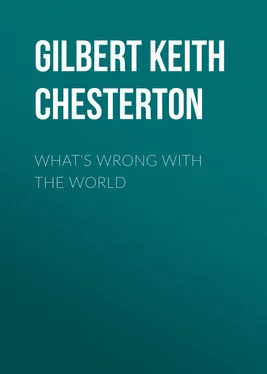Gilbert Chesterton - What's Wrong with the World
Здесь есть возможность читать онлайн «Gilbert Chesterton - What's Wrong with the World» — ознакомительный отрывок электронной книги совершенно бесплатно, а после прочтения отрывка купить полную версию. В некоторых случаях можно слушать аудио, скачать через торрент в формате fb2 и присутствует краткое содержание. Издательство: Иностранный паблик, Жанр: foreign_antique, foreign_prose, на английском языке. Описание произведения, (предисловие) а так же отзывы посетителей доступны на портале библиотеки ЛибКат.
- Название:What's Wrong with the World
- Автор:
- Издательство:Иностранный паблик
- Жанр:
- Год:неизвестен
- ISBN:нет данных
- Рейтинг книги:4 / 5. Голосов: 1
-
Избранное:Добавить в избранное
- Отзывы:
-
Ваша оценка:
- 80
- 1
- 2
- 3
- 4
- 5
What's Wrong with the World: краткое содержание, описание и аннотация
Предлагаем к чтению аннотацию, описание, краткое содержание или предисловие (зависит от того, что написал сам автор книги «What's Wrong with the World»). Если вы не нашли необходимую информацию о книге — напишите в комментариях, мы постараемся отыскать её.
What's Wrong with the World — читать онлайн ознакомительный отрывок
Ниже представлен текст книги, разбитый по страницам. Система сохранения места последней прочитанной страницы, позволяет с удобством читать онлайн бесплатно книгу «What's Wrong with the World», без необходимости каждый раз заново искать на чём Вы остановились. Поставьте закладку, и сможете в любой момент перейти на страницу, на которой закончили чтение.
Интервал:
Закладка:
When four knights scattered the blood and brains of St. Thomas of Canterbury, it was not only a sign of anger but of a sort of black admiration. They wished for his blood, but they wished even more for his brains. Such a blow will remain forever unintelligible unless we realise what the brains of St. Thomas were thinking about just before they were distributed over the floor. They were thinking about the great mediaeval conception that the church is the judge of the world. Becket objected to a priest being tried even by the Lord Chief Justice. And his reason was simple: because the Lord Chief Justice was being tried by the priest. The judiciary was itself sub judice. The kings were themselves in the dock. The idea was to create an invisible kingdom, without armies or prisons, but with complete freedom to condemn publicly all the kingdoms of the earth. Whether such a supreme church would have cured society we cannot affirm definitely; because the church never was a supreme church. We only know that in England at any rate the princes conquered the saints. What the world wanted we see before us; and some of us call it a failure. But we cannot call what the church wanted a failure, simply because the church failed. Tracy struck a little too soon. England had not yet made the great Protestant discovery that the king can do no wrong. The king was whipped in the cathedral; a performance which I recommend to those who regret the unpopularity of church-going. But the discovery was made; and Henry VIII scattered Becket’s bones as easily as Tracy had scattered his brains.
Of course, I mean that Catholicism was not tried; plenty of Catholics were tried, and found guilty. My point is that the world did not tire of the church’s ideal, but of its reality. Monasteries were impugned not for the chastity of monks, but for the unchastity of monks. Christianity was unpopular not because of the humility, but of the arrogance of Christians. Certainly, if the church failed it was largely through the churchmen. But at the same time hostile elements had certainly begun to end it long before it could have done its work. In the nature of things it needed a common scheme of life and thought in Europe. Yet the mediaeval system began to be broken to pieces intellectually, long before it showed the slightest hint of falling to pieces morally. The huge early heresies, like the Albigenses, had not the faintest excuse in moral superiority. And it is actually true that the Reformation began to tear Europe apart before the Catholic Church had had time to pull it together. The Prussians, for instance, were not converted to Christianity at all until quite close to the Reformation. The poor creatures hardly had time to become Catholics before they were told to become Protestants. This explains a great deal of their subsequent conduct. But I have only taken this as the first and most evident case of the general truth: that the great ideals of the past failed not by being outlived (which must mean over-lived), but by not being lived enough. Mankind has not passed through the Middle Ages. Rather mankind has retreated from the Middle Ages in reaction and rout. The Christian ideal has not been tried and found wanting. It has been found difficult; and left untried.
It is, of course, the same in the case of the French Revolution. A great part of our present perplexity arises from the fact that the French Revolution has half succeeded and half failed. In one sense, Valmy was the decisive battle of the West, and in another Trafalgar. We have, indeed, destroyed the largest territorial tyrannies, and created a free peasantry in almost all Christian countries except England; of which we shall say more anon. But representative government, the one universal relic, is a very poor fragment of the full republican idea. The theory of the French Revolution presupposed two things in government, things which it achieved at the time, but which it has certainly not bequeathed to its imitators in England, Germany, and America. The first of these was the idea of honorable poverty; that a statesman must be something of a stoic; the second was the idea of extreme publicity. Many imaginative English writers, including Carlyle, seem quite unable to imagine how it was that men like Robespierre and Marat were ardently admired. The best answer is that they were admired for being poor – poor when they might have been rich.
No one will pretend that this ideal exists at all in the haute politique of this country. Our national claim to political incorruptibility is actually based on exactly the opposite argument; it is based on the theory that wealthy men in assured positions will have no temptation to financial trickery. Whether the history of the English aristocracy, from the spoliation of the monasteries to the annexation of the mines, entirely supports this theory I am not now inquiring; but certainly it is our theory, that wealth will be a protection against political corruption. The English statesman is bribed not to be bribed. He is born with a silver spoon in his mouth, so that he may never afterwards be found with the silver spoons in his pocket. So strong is our faith in this protection by plutocracy, that we are more and more trusting our empire in the hands of families which inherit wealth without either blood or manners. Some of our political houses are parvenue by pedigree; they hand on vulgarity like a coat of-arms. In the case of many a modern statesman to say that he is born with a silver spoon in his mouth, is at once inadequate and excessive. He is born with a silver knife in his mouth. But all this only illustrates the English theory that poverty is perilous for a politician.
It will be the same if we compare the conditions that have come about with the Revolution legend touching publicity. The old democratic doctrine was that the more light that was let in to all departments of State, the easier it was for a righteous indignation to move promptly against wrong. In other words, monarchs were to live in glass houses, that mobs might throw stones. Again, no admirer of existing English politics (if there is any admirer of existing English politics) will really pretend that this ideal of publicity is exhausted, or even attempted. Obviously public life grows more private every day. The French have, indeed, continued the tradition of revealing secrets and making scandals; hence they are more flagrant and palpable than we, not in sin but in the confession of sin. The first trial of Dreyfus might have happened in England; it is exactly the second trial that would have been legally impossible. But, indeed, if we wish to realise how far we fall short of the original republican outline, the sharpest way to test it is to note how far we fall short even of the republican element in the older regime. Not only are we less democratic than Danton and Condorcet, but we are in many ways less democratic than Choiseul and Marie Antoinette. The richest nobles before the revolt were needy middle-class people compared with our Rothschilds and Roseberys. And in the matter of publicity the old French monarchy was infinitely more democratic than any of the monarchies of today. Practically anybody who chose could walk into the palace and see the king playing with his children, or paring his nails. The people possessed the monarch, as the people possess Primrose Hill; that is, they cannot move it, but they can sprawl all over it. The old French monarchy was founded on the excellent principle that a cat may look at a king. But nowadays a cat may not look at a king; unless it is a very tame cat. Even where the press is free for criticism it is only used for adulation. The substantial difference comes to something uncommonly like this: Eighteenth century tyranny meant that you could say “The K__ of Br__rd is a profligate.” Twentieth century liberty really means that you are allowed to say “The King of Brentford is a model family man.”
Читать дальшеИнтервал:
Закладка:
Похожие книги на «What's Wrong with the World»
Представляем Вашему вниманию похожие книги на «What's Wrong with the World» списком для выбора. Мы отобрали схожую по названию и смыслу литературу в надежде предоставить читателям больше вариантов отыскать новые, интересные, ещё непрочитанные произведения.
Обсуждение, отзывы о книге «What's Wrong with the World» и просто собственные мнения читателей. Оставьте ваши комментарии, напишите, что Вы думаете о произведении, его смысле или главных героях. Укажите что конкретно понравилось, а что нет, и почему Вы так считаете.







